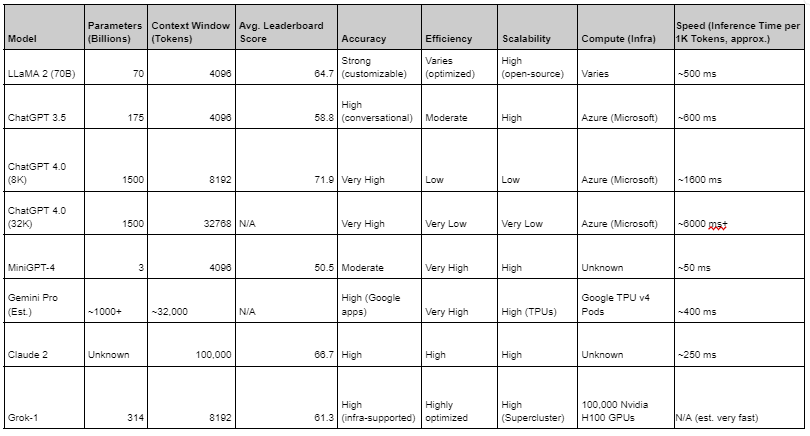The world of artificial intelligence is rapidly evolving, and recent developments in AI language models are making waves in technology and business. These models, such as ChatGPT, Gemini, Grok, Claude, and LLaMA, have revolutionized how machines interpret and generate human language. The latest updates, particularly from OpenAI and xAI, showcase groundbreaking innovations that promise to redefine the capabilities and applications of AI technology.
One of the most significant advancements comes from xAI with its new Memphis Supercluster, a state-of-the-art compute infrastructure designed to support and train advanced AI models like Grok. The Memphis Supercluster, spearheaded by Elon Musk’s xAI, leverages 100,000 liquid-cooled Nvidia H100 GPUs, positioning it as the world’s most powerful AI training cluster. This unprecedented computational power allows Grok to handle complex language tasks with remarkable speed and accuracy, potentially disrupting AI development. The Memphis infrastructure optimizes performance by managing resources efficiently, enabling Grok to quickly process large datasets and improve text generation accuracy.
Nice work by @xAI team, @X team, @Nvidia & supporting companies getting Memphis Supercluster training started at ~4:20am local time.
With 100k liquid-cooled H100s on a single RDMA fabric, it’s the most powerful AI training cluster in the world!
— Elon Musk (@elonmusk) July 22, 2024
Meanwhile, OpenAI is taking steps to challenge Google’s dominance in the search engine space with ChatGPT’s latest update, SearchGPT. SearchGPT is a prototype designed to integrate AI language capabilities into search engines, providing quick, accurate, and source-verified answers. OpenAI announced this initiative on July 25, 2024, indicating that it aims to offer users a more personalized and intelligent search experience by integrating conversational AI with traditional search methods. OpenAI’s integration of conversational AI into search engines marks a significant shift in AI applications. It signals an era where AI not only assists with queries but actively participates in the search process, making interactions more intuitive and context-aware.
We’re testing SearchGPT, a temporary prototype of new AI search features that give you fast and timely answers with clear and relevant sources.
We’re launching with a small group of users for feedback and plan to integrate the experience into ChatGPT. https://t.co/dRRnxXVlGh pic.twitter.com/iQpADXmllH
— OpenAI (@OpenAI) July 25, 2024
The AI landscape also includes notable contributions from other major players. Google’s Gemini, known for its seamless integration with Google services like Search and Translate, continues to refine its architecture for greater efficiency and performance. While specific details about its parameters remain under wraps, Gemini’s potential impact on Google’s ecosystem is significant. Anthropic’s Claude, emphasizing ethical AI practices, has improved its safety and interpretability features, positioning itself for sensitive applications in healthcare and education. Meta AI’s LLaMA model remains a cornerstone of open-source AI, offering researchers customizable solutions for academic and industry use.
Exclusive: Meta just released Llama 3.1 405B — the first-ever open-sourced frontier AI model, beating top closed models like GPT-4o across several benchmarks.
I sat down with Mark Zuckerberg, diving into why this marks a major moment in AI history.
Timestamps:
00:00 Intro… pic.twitter.com/wI0X86P0dM
— Rowan Cheung (@rowancheung) July 23, 2024
As AI models evolve, the race to develop more intelligent and efficient systems continues, driven by advancements in computational power, algorithmic innovations, and access to large-scale datasets. This rapid growth presents both opportunities and challenges. On the one hand, enhanced AI models lead to innovative applications across industries like finance, healthcare, and education. On the other hand, the resource demands and ethical implications of these models require careful consideration. The industry faces ongoing debates about balancing model size and efficiency, optimizing AI models for specific tasks without sacrificing performance.
The AI landscape is undergoing transformative changes, with innovations such as xAI’s Memphis Supercluster and OpenAI’s SearchGPT pushing the boundaries of what AI can achieve. These developments reflect a dynamic field driven by collaboration and competition, where new models and technologies continue to reshape our understanding and interaction with artificial intelligence. As AI continues to evolve, it will undoubtedly play a critical role in shaping the future of technology and society.


